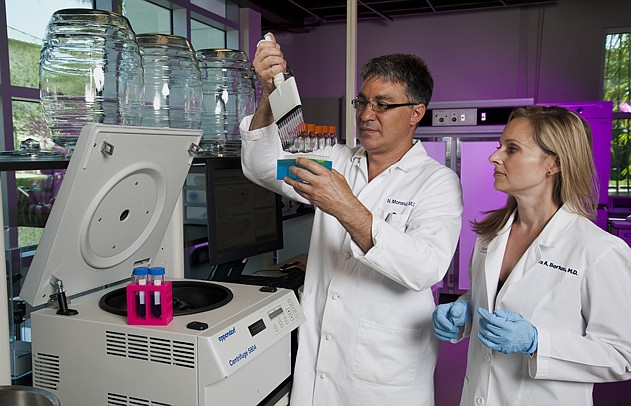- July 26, 2024
-
-
Loading

Loading

Dr. Eva Berkes, an immunologist and allergist, and her husband, Dr. Nicholas Monsul, a plastic surgeon, have spent nearly $1 million on a tantalizing, yet unproven biotechnology business concept: That there's a better way for physicians to treat thousands, if not millions, of infections.
Their theory begins by analyzing the human microbiome — a vast collection of microbes found all over a human body, from the mouth to toes. The microbes grow into biofilm, a group of microorganisms that, over time, can become immune to traditional antibiotics — a dilemma many doctors, and patients, struggle with.
But Berkes and Monsul decided there must be a way to flip the biofilm into a medicine that treats the infections better than antibiotics. In other words, according to Berkes, “being exposed to the right germs, at the right time, could be good for your immune system.”
The capacity to bring this idea to the marketplace with a series of products in a profitable business is expensive and time-consuming — a lesson the physicians have learned the last two years. Roughly 95% of the near seven-figure investment is their own money, though they have recently begun to seek more outside funding.
Berkes and Monsul nonetheless believe they are on the cusp of a major business breakthrough with Sarasota-based Quorum Innovations, their seven-employee research lab. Quorum is a separate business entity housed in the Hawthorne Clinic, a practice that combines Berkes' allergy, asthma and immunology practice with Monsul's plastic surgery practice. The clinic is across the street from Sarasota Memorial Hospital.
“It's an awesome time to be in this business,” says Berkes. “We are ahead of the curve because the big drug companies haven't adjusted to the new science.”
Yet that advantage, says Monsul, could quickly become a liability if major drug companies invest heavily in the same research. To fend that off, Monsul says clinical trials of Quorum creams and nasal sprays designed to treat skin conditions, dry eye and sinusitis could begin by June.
Monsul further expects some of those products will be sold over the counter by the end of 2013, which would give the firm its first batch of sales. The clinical trials, at least at first, will be for over-the-counter products so Quorum can prove to consumers that the medicines work. But Monsul says he would consider seeking FDA approval for prescription drugs at some point, a more laborious process, if the initial products are successful.
While Quorum prepares for its clinic trials, Monsul has spent a considerable amount of time and money on preventive medicine in regard to patent protection. Quorum has one patent, and plans to submit paperwork for another one in the next few months. It also hired Frederick Boehm, an attorney who formerly ran the intellectual property-legal department at IBM, one of the more prolific patent producers in the world. Boehm, who had semi-retired in the region, is the vice president of patent and legal affairs at Quorum.
The initial idea for Quorum, meanwhile, stems from Berkes' experience with patients who regularly returned to her office with the same problems: sinusitis and eczema, a skin condition. Like many other doctors, she mostly treated the conditions with topical creams and other medications — which worked, until it didn't.
“It was uninspiring to us and our patients,” says Berkes. “We had to go for innovation if we wanted a different result.”